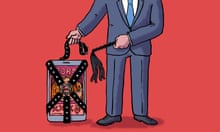American sex workers say subscription website OnlyFans’ decision to ban “sexually explicit” content will threaten their livelihoods, drive more of the industry underground, and ultimately endanger lives.
“They are taking away our safe spaces,” said Jane, an activist and OnlyFans creator who asked to be identified only by her first name. “Nobody wants to protect us.”
OnlyFans, a subscriber-only website that hosts a range of producers but is most well-known for adult content, has exploded in popularity over the past year as sex work – like many professions – moved online amid the pandemic.
Activists say the banning of pornographic content will push more people into danger. “This change will put workers on the street who could otherwise afford rent, it will starve the children of sex workers who could otherwise afford to feed them, and it will force workers currently working remotely online into riskier street-based sex work,” said Mary Moody, an online sex worker and co-chair of the Adult Industry Laborers and Artists Association.
OnlyFans has been preferred by online sex workers because of its low fees compared with many adult camera and other content sites, allowing them to take home 80% of their earnings. Many say it has given them financial freedom they have not found in other industries.
The decision will be “disastrous” for sex workers who used the platform to make their own earnings and gain more control of the work process, said Heather Berg, assistant professor of women, gender and sexuality studies at Washington University in St Louis.
“For people who made a living off studio porn previously, the move to OnlyFans has meant significantly more control over safety, partner choice and representation – particularly important for performers of color and trans people,” she said. “This decision will move control and profit back into producers’ hands.”
The platform said in a statement the changes are meant to comply with the requests of its “banking partners and payout providers”.
Payment companies are increasingly cracking down on adult content, forcing online platforms that use the banking services to comply with more stringent rules.
In 2020, following a report from the New York Times alleging “revenge porn” was posted on the prominent site Pornhub, Mastercard and Visa temporarily banned payments to Pornhub’s host company MindGeek. Tens of millions of consensual but unverified videos were removed in response, cutting off income for thousands of sex workers.
In April, MasterCard updated its rules, announcing it would require “clear, unambiguous and documented consent” for content on all the platforms using it as a payment processor.
Such changes “irreparably harm” members of the community, particularly marginalized groups like trans sex workers and people of color, said Moody.
“Whenever de-banking or de-platforming occurs, the workers who are most vulnerable are the ones to bear the brunt of the harm,” she said. “Make no mistake, this change will kill sex workers.”
OnlyFans as of June was valued at over $1bn after growing at a rate of more than 100% in recent months. The platform has enjoyed massive popularity primarily due to adult content, only to remove the very creators responsible, in a kind of “digital gentrification,” activists say.
“OnlyFans would not exist without sex workers,” said Cathy Reisenwitz, who is in the top 4% of creators on the site in terms of subscribers. “We have seen this happen before where companies create a lot of profit and a huge audience on the back of sex workers and then remove them when they get to a certain level of success.”
The sanitization of OnlyFans is the latest in a long line of instances of internet censorship pushing sex workers to the margins. Tumblr in 2018 banned adult content and the subscription site Patreon did the same.
Following the passage in 2018 of Fosta-Sesta, legislation aimed at combatting online sex trafficking by making websites criminally liable for users’ content, sex workers reported being kicked off websites like Craigslist, Reddit and Google, and the popular platform Backpage was removed.
“Sex workers are once again feeling the same panic that another lifeline is being taken away,” said Kate D’Adamo, a sex worker organizer.









